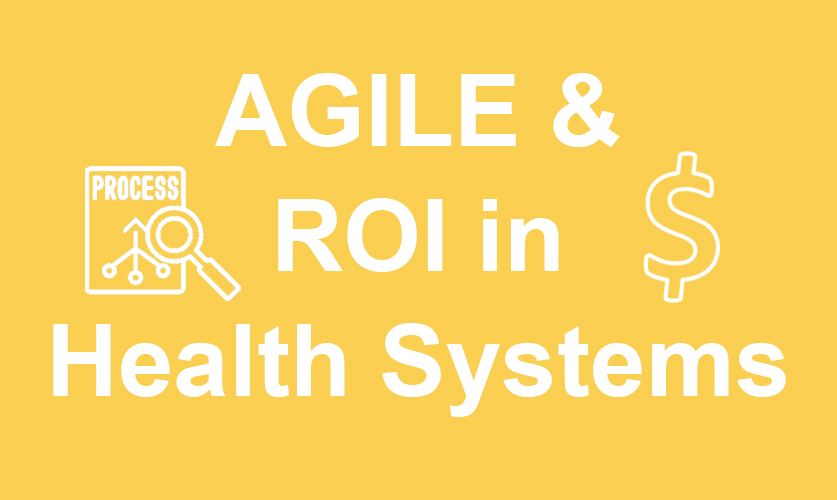Integrating AGILE Practices in Order to Improve ROI for Health Systems
Building software is like solving a puzzle! When a problem stands before me, I use my creativity and problem-solving ability to come up with a solution. An important lesson I have learnt in my 20-year software career is that there are only two constants in this field: change and the need to take care of people. Both are the key drivers for innovation at scale, which in my opinion, is the single biggest factor for fueling business growth at modern technology companies. Over my immensely gratifying journey, software and technology have evolved significantly, and over the next 20 years, they will continue to do so, which makes the need for innovation at scale a very important topic at a modern software company!
Being a leader is truly about people, and less about process and technology. Individuals over processes and tools, and responding to change over following a plan – these are two components of the AGILE software development manifesto that I whole-heartedly believe in. In my opinion, the single most vital skillset for strong leadership is people management. Without people, there is nothing to lead! The complexity of software development makes it almost impossible for any one person to truly know the ins and outs of every platform. It cannot be a one-person job, no matter how smart the person is. As leaders, we must rely on a culture of openness and transparency. Without innovation, we cannot grow and be competitive; diverse thoughts and opinions feed innovation.
Dedication to innovation and people is what brought me to the Parlance team. We, at Parlance, not only value servant leadership and our own people, but are extremely dedicated to our customers and the users of our platform! At Parlance, we are caller advocates; at our core is a mission to help health systems provide exceptional experiences to their calling community – staff AND callers. Though growth and innovation are generally considered good, they can also come with growing pains. While some may present in the form of scale, others come in the form of change. However, despite sometimes being unpopular, change is inevitable. Plans will always change – they’re supposed to! Market requirements and needs change. The strongest teams are the ones that able to respond well to these changes – that’s what makes them resilient. While we often complain about changes, I say that we must expect and embrace them. The process of implementing systemic change in a health system can be exhaustive, time-consuming, and costly. With Parlance, health systems easily achieve a quick win at the front end of a digital transformation process by implementing speech-enabled call routing.
When pushing to be competitive in today’s ever-changing software market, one of the greatest players is speed. I strongly believe that speed wins. However, trying to be quick in software development is always tricky. Many teams cut corners to be fast, making compromises on quality, and taking on a lot of tech debt. Speed is only good if you are also ensuring quality. Not every change – or development, or new solution – will always be perfect. As any software developer or solutions engineer can tell you, not every build will work 100% of the time – in fact, many will fail. Because of this, it is important to fail quickly. Continuous integration and continuous deployment allow a decreased risk while increasing speed and efficiency. By having smaller releases into production more frequently, it is easier to rollback if there are any problems. As I implement my philosophies with the Parlance team, our customers directly benefit, because not only do we maintain the fully managed solution, we put out software at a faster cycle in production, while also ensuring quality. New features and bug fixes are put out faster, while quality is maintained with any code we put into production.
In practicing these AGILE principles with modern software development practices such as Cloud Native and CI/CD, we look at software development tasks in smaller pieces and make good design decisions to improve efficiency. Our team uses automation wherever possible to save resources, a philosophy that we not only practice internally, but that our entire model is based off of. Parlance is a Software as a Service company that enables health systems nationwide to leverage intelligent speech technology to automate how they answer the phone and help patients speak naturally and connect quickly.
In the end though, it all comes back to people. Without maintaining a people-focused attitude, none of this can be accomplished. At Parlance, we are servant leaders to our team. To callers, we are caller advocates with a mission to eliminate phone trees, hold times, and frustration. To customers and their front-line staff, we are a welcome reprieve and partner, guaranteeing ROI and optimized business operations. As a leader in the software space, I work to understand businesses, leverage skillsets, and practice people management to help businesses grow, while ensuring that everyone is happy.
Being a leader is truly about people, and less about process and technology. Individuals over processes and tools, and responding to change over following a plan – these are two components of the AGILE software development manifesto that I whole-heartedly believe in. In my opinion, the single most vital skillset for strong leadership is people management. Without people, there is nothing to lead! The complexity of software development makes it almost impossible for any one person to truly know the ins and outs of every platform. It cannot be a one-person job, no matter how smart the person is. As leaders, we must rely on a culture of openness and transparency. Without innovation, we cannot grow and be competitive; diverse thoughts and opinions feed innovation.
Dedication to innovation and people is what brought me to the Parlance team. We, at Parlance, not only value servant leadership and our own people, but are extremely dedicated to our customers and the users of our platform! At Parlance, we are caller advocates; at our core is a mission to help health systems provide exceptional experiences to their calling community – staff AND callers. Though growth and innovation are generally considered good, they can also come with growing pains. While some may present in the form of scale, others come in the form of change. However, despite sometimes being unpopular, change is inevitable. Plans will always change – they’re supposed to! Market requirements and needs change. The strongest teams are the ones that able to respond well to these changes – that’s what makes them resilient. While we often complain about changes, I say that we must expect and embrace them. The process of implementing systemic change in a health system can be exhaustive, time-consuming, and costly. With Parlance, health systems easily achieve a quick win at the front end of a digital transformation process by implementing speech-enabled call routing.
When pushing to be competitive in today’s ever-changing software market, one of the greatest players is speed. I strongly believe that speed wins. However, trying to be quick in software development is always tricky. Many teams cut corners to be fast, making compromises on quality, and taking on a lot of tech debt. Speed is only good if you are also ensuring quality. Not every change – or development, or new solution – will always be perfect. As any software developer or solutions engineer can tell you, not every build will work 100% of the time – in fact, many will fail. Because of this, it is important to fail quickly. Continuous integration and continuous deployment allow a decreased risk while increasing speed and efficiency. By having smaller releases into production more frequently, it is easier to rollback if there are any problems. As I implement my philosophies with the Parlance team, our customers directly benefit, because not only do we maintain the fully managed solution, we put out software at a faster cycle in production, while also ensuring quality. New features and bug fixes are put out faster, while quality is maintained with any code we put into production.
In practicing these AGILE principles with modern software development practices such as Cloud Native and CI/CD, we look at software development tasks in smaller pieces and make good design decisions to improve efficiency. Our team uses automation wherever possible to save resources, a philosophy that we not only practice internally, but that our entire model is based off of. Parlance is a Software as a Service company that enables health systems nationwide to leverage intelligent speech technology to automate how they answer the phone and help patients speak naturally and connect quickly.
In the end though, it all comes back to people. Without maintaining a people-focused attitude, none of this can be accomplished. At Parlance, we are servant leaders to our team. To callers, we are caller advocates with a mission to eliminate phone trees, hold times, and frustration. To customers and their front-line staff, we are a welcome reprieve and partner, guaranteeing ROI and optimized business operations. As a leader in the software space, I work to understand businesses, leverage skillsets, and practice people management to help businesses grow, while ensuring that everyone is happy.
About Parlance:
For over 25 years, organizations nationwide have depended on Parlance to modernize and improve the first 30 seconds of every caller’s journey and remove barriers to service. With Parlance, people can speak naturally and connect directly to the resources they need. No confusing menus, no numbers to press, no long hold times. Parlance relieves the burden of routine transfers and poor self-service, so business operations are optimized, and live agent effort is saved for more complex calls.
By Sanjay Yadav
By Sanjay Yadav




